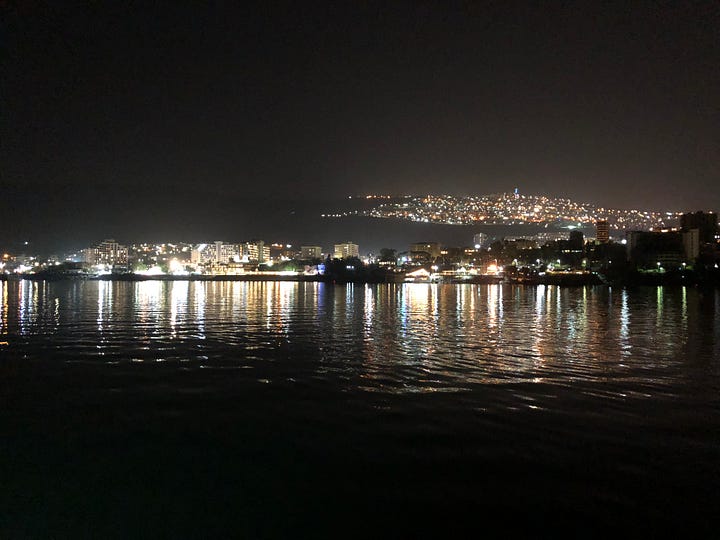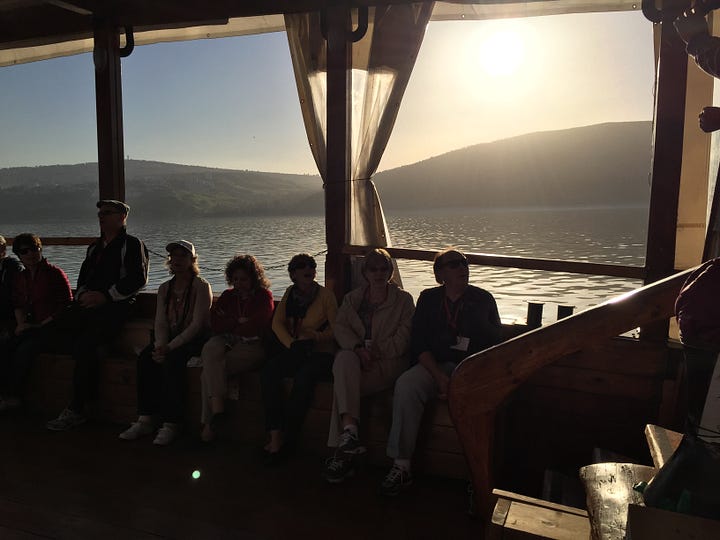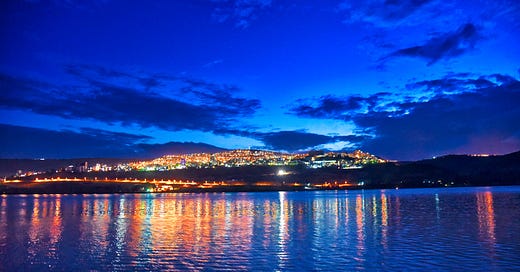A Burial at Sea: A Personal, Pastoral Moment on the Sea of Galilee
Meeting a Moment with Words of Faith
The Tools We Have: Words
When a child is born, when a marriage is begun, when a loved one dies, when a journey is celebrated, it falls to pastors and ordained leaders in a congregation to speak the words that frame those moments with the promises of God.
Words that remind people who we are, where we are going, and of the love that will never let us go.
For clergy, our stock in trade—practically the only tools we have in our toolbox—are words. Words must meet the moment. We have to speak the truth. Explain mysteries as best we are able. Interpret biblical texts. Apply biblical truths.
In preaching, we use words of hope and truth. In discipleship, we offer words that teach or train. In worship, we say liturgical words that lift hearts toward God. When we evangelize, we use words to challenge or invite. And in the sacred moments of life—when a child is born, when a loved one dies, when a marriage is begun or a crisis survived—priests, pastors, and ministers step forward to provide words. Words bless, they anchor, they testify that we are all pilgrims, passing through a fleeting world, held fast by the promises of God.
This is a story about how words met a moment for a woman, a son, and a group of people in Israel one evening on the Sea of Galilee.
Jessie and Derrick
On the second evening of our Holy Land tour, Jessie came to me after dinner. Jessie’s hand trembled slightly as she reached for mine. Tears welled in her eyes as she whispered,
“I brought Derrick’s ashes. He wanted to come here. What can we do with them?”
I knew Jessie well. She and her adult son had joined us on this pilgrimage to the Holy Land—a journey meant for her and Derrick together. They—husband and wife— had registered for the trip. He had dreamed of it. But his sudden death months earlier had left the dream unfinished.
I had led his memorial service back at Christ Church, but there had been no final resting place for his ashes. Now, 7,000 miles later, Jessie carried Derrick to the land he had longed to see.
When she told me she had brought her husband's ashes with her, I was surprised. What could I do with them? I held her hand tightly. My mind raced through the next day’s itinerary, looking for a window, a way, a place where we might honor his life and faith.
I began thinking about where I could find a moment and some words to say to meet that moment.
“Of course, Jessie,” I said. “We will do something.”
The following day, I quietly asked her son Darrel to carry the ashes with him throughout the day. Let’s see what God provides, I thought.
That evening, as the sun lowered into the western hills, we boarded a small boat to cross the Sea of Galilee toward Tiberias. The waters stretched smooth as glass, touched only by the ripples of our wake.




The Sea of Galilee—also called the Sea of Tiberias—is a jewel tucked in a basin below sea level, sixteen miles long, seven miles wide, wrapped in hills that glow gold at sunset. Josephus, the ancient Jewish historian, once called it the “Pride of Nature,” and looking over the calm waters, you could see why.
We pushed away from shore. Dusk deepened. We approached Tiberias, the Roman city, on the western shore.
After a few minutes, I asked the captain to cut the engine. Silence fell around us like a heavy blanket. In the distance, the faint lights of Tiberias flickered to life. The eastern hills of Jordan became mere shadow.
Now we were adrift, unseen by the world, wrapped in near darkness, floating under a vast, starry sky.
I made my way to Jessie and her son.
“Are you ready?” I asked. They nodded silently.
Turning to the others on the benches around the boat, I knew I couldn’t simply scatter the ashes. We needed words. We needed the Good News. It was time for me to say a few things.
“Tonight,” I said, “I want to answer a question every person asks eventually—sometimes aloud, sometimes silently: What happens after we die?”
I told them about Derrick. About Jessie’s quiet burden. About the ashes she carried across the ocean.
I opened my Bible to 1 Corinthians 15 and, under the soft light of my iPhone, began to read aloud.
Unless a Seed…
Paul knew how to speak of death and hope in the same breath. Writing to the church at Corinth, he spoke to people who, like us, had lost those they loved and needed to know what came next.
“If you look at an acorn,” I said, “you would never predict the majesty of the oak tree it becomes. In the same way, the body we bury or scatter on the waters is only a seed of what will be. The glory to come is beyond imagining.”
I read Paul’s words:
“What is sown is perishable; what is raised is imperishable. It is sown in dishonor; it is raised in glory. It is sown in weakness; it is raised in power. It is sown a natural body; it is raised a spiritual body.” (1 Corinthians 15:43–44)
I went on:
“When the dust settles—when all is said and done—we will be made like him. Just as we have borne the image of the man of dust, (Adam) we shall also bear the image of the man of heaven.”
I read Paul’s words:
“As was the man of dust, so also are those who are of the dust, and as is the man of heaven, so also are those who are of heaven. Just as we have borne the image of the man of dust, we shall also bear the image of the man of heaven.” (1 Corinthians 15:48–49)
The silence on the boat deepened. No one moved. No one spoke.
Finally, I said,
“Tonight, we release the ashes of a brother in Christ into the waters of the Sea of Galilee. He died in faith—and because Christ lives, so shall he. Derrick died in weakness, as we all shall. But resurrection glory is coming. Death is real—but it has no final victory.”
Jessie and her son moved to the bow of the boat.
I lifted my voice into the night and intoned more words—these from the Burial Office of the Book of Common Prayer, quoting the words of Job, over 5000 years earlier.
“I know that my Redeemer lives, and at the last he will stand upon the earth. And after my skin has been thus destroyed, yet in my flesh I shall see God.” (Job 19:25–27)
Daryll, her son, opened a small box and handed it to me. I turned out toward the darkness and released Derrick’s ashes into the still, black waters. A soft breeze swept them away as they fell into the water
I concluded with more words— words from the Book of Common Prayer:
“Ashes to ashes, dust to dust. All of us go down to the dust, yet even at the grave we make our song: Alleluia, alleluia, alleluia.”
It Is Well with My Soul
I turned back to the group and saw faces streaked with tears—not only for Jessie, not only for Derrick, but for every loss we all carry silently in our hearts.
Death wounds us all. Every Christian has lost someone to the enemy of death. But because of Christ, death has no future.
And then, quietly at first, a woman’s voice broke the silence:
“When peace like a river attendeth my way,
When sorrows like sea billows roll…”
One by one, our voices joined her.
“Whatever my lot, Thou hast taught me to say,
It is well, it is well with my soul.”
Hope filled the darkness.
When we finally pulled into the dock at Tiberias, we were not the same people who had pushed off an hour before. The Word of God had found us on the water. Grief had been met with words of hope. Sorrow had been met with the words of a song. Death had been met with the words of the promise of life.
And Jesus, who once spoke words to calm the storms on this very sea, had come again to speak words of peace into our hearts.
The power of words.
The Anglican is the Substack newsletter for LeaderWorks, where I share insights, encouragement, and practical tools for clergy and lay Christians. I’m also an author of over a dozen books available on Amazon.
If you are a Paid Subscriber, thank you! Thank you for supporting The Anglican and the ministry of LeaderWorks. If you are not a subscriber, please consider becoming one today.






Beautiful, so very beautiful. Thanks to my son's generosity, he gifted me a Holy Land Journey with you and Fran years ago. This encounter took me back to a time and place I shall never forget. Thank you for bringing forward a wonderful memory.
What a beautiful and heartwarming story, David. Having been with you in Israel and on the Sea of Galilee, I can picture it all. It must have been such a profound experience that no one on that boat will ever forget. The respect for a life that was well lived, the sorrow of that mom and her son in letting go of the remains of her husband and his dad, but the joy and reassurance of the eternal life after our time on earth has ended; it touched my heart deeply. Thank you for sharing.